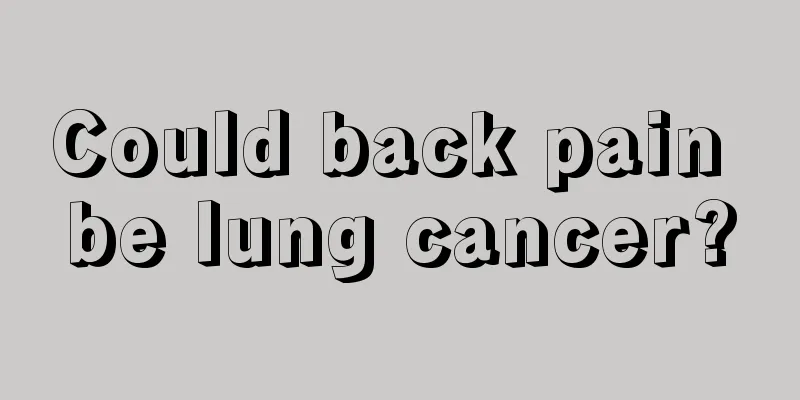I have to pee urgently but I can't pee

|
Urine is a kind of waste water and toxins excreted from our body. Many people easily encounter the situation of urinary urgency but inability to urinate, which greatly affects their life and work. This may be a manifestation of a disease. The urgency but inability to urinate may be caused by urinary tract infection, which requires timely examination and treatment. You can usually eat some diuretic foods. Why do I feel the urge to urinate but can't urinate? Considering that the discomfort is caused by urinary tract infection, you need to go to the hospital for examination and treatment. Causes More than 95% of urinary tract infections are caused by a single bacteria. The pathogen is Escherichia coli, which can be classified into 140 types of serotypes. The urinary infection-causing Escherichia coli is the same type as the Escherichia coli isolated from the patient's feces, and is often seen in asymptomatic bacteriuria or uncomplicated urinary infection; Proteus, Clostridium difficile, Klebsiella pneumoniae, Pseudomonas aeruginosa, and fecal Streptococcus are seen in patients with reinfection, indwelling catheters, and complicated urinary tract infections; Candida albicans and Cryptococcus neoformans infections are often seen in patients with diabetes and those using glucocorticoids and immunosuppressants and after kidney transplantation; Staphylococcus aureus is often seen in bacteremia and sepsis caused by skin trauma and drug addicts; although viral and mycoplasma infections are rare, they have tended to increase in recent years. Various bacterial infections are seen in indwelling catheters, neurogenic bladder, stones, congenital malformations, and vaginal, intestinal, and urethral fistulas. Clinical manifestations 1. Acute simple cystitis The onset is sudden, and the onset in female patients is often related to sexual activity. The main manifestations are bladder irritation signs, namely frequent urination, urgency, pain when urinating, discomfort in the bladder area or perineum, and a burning sensation in the urethra; the degree of urinary frequency varies, and in severe cases, urge urinary incontinence may occur; the urine is turbid, there are white blood cells in the urine, terminal hematuria is common, and sometimes it is full-time hematuria, and even blood clots are discharged. Generally there are no obvious systemic infection symptoms, and the body temperature is normal or there is a low fever. 2. Acute simple pyelonephritis (1) Urinary system symptoms include bladder irritation signs such as frequent urination, urgency, and pain during urination; hematuria; low back pain on the affected side or both sides; obvious tenderness or percussion pain at the costovertebral angle on the affected side; (2) Symptoms of systemic infection such as chills, high fever, headache, nausea, vomiting, loss of appetite, etc. are often accompanied by increased white blood cell count and increased erythrocyte sedimentation rate. 3. Asymptomatic bacteriuria Asymptomatic bacteriuria is a hidden urinary tract infection, which is more common in elderly women and pregnant women. Patients do not have any symptoms of urinary tract infection, and the incidence rate increases with age. 4. Complicated urinary tract infection The clinical manifestations of complicated urinary tract infection vary greatly, and are often accompanied by other diseases that increase the risk of infection or treatment failure, with or without clinical symptoms (such as frequent urination, urgency, dysuria, dysuria, low back pain, costovertia angle tenderness, suprapubic pain and fever, etc.). Complicated urinary tract infections are often accompanied by other diseases, such as diabetes and renal failure; they also cause many sequelae, the most serious and fatal of which include urosepsis and renal failure. Renal failure can be divided into acute and chronic, reversible and irreversible. treat 1. Urinary tract infection in non-pregnant women (1) A three-day therapy is recommended for the treatment of acute simple cystitis, which consists of taking oral co-sulfamethoxazole, ofloxacin, or levofloxacin. Because the efficacy of single-dose therapy is not as good as the three-day therapy, it is no longer recommended. In areas where the resistance rate of pathogens to sulfamethoxazole is as high as 10% to 20%, nitrofurantoin can be used for treatment. (2) For the treatment of acute simple pyelonephritis, it is recommended to use antibiotics for 14 days. For patients with mild acute pyelonephritis, the course of treatment can be shortened to 7 days using high-efficiency antibiotics. For mild cases, oral quinolones can be used for treatment. If the pathogen is sensitive to trimethoprim-sulfamethoxazole, this drug can also be taken orally. If the causative bacteria are gram-positive, treatment can be with amoxicillin alone or amoxicillin/clavulanate potassium. For severe cases or those who cannot take oral medications, they should be hospitalized and treated with intravenous quinolones or broad-spectrum cephalosporin antibiotics. For those who are resistant to β-lactam antibiotics and quinolone antibiotics, aztreonam can be used for treatment. If the pathogen is a Gram-positive coccus, ampicillin/sulbactam sodium can be used, and combined medication can be used if necessary. If the condition improves, sensitive antibiotics can be selected for oral treatment based on the urine culture results. Regimen adjustment and follow-up are very important during medication. Urine culture should be performed every 1 to 2 weeks to observe whether the urine bacteria turns negative. Quantitative urine bacterial culture should be performed at the end of the treatment and 2 and 6 weeks after stopping the medication. It is best to review it once a month thereafter. (3) Complicated urinary tract infection The treatment plan for complicated urinary tract infection depends on the severity of the disease. In addition to antimicrobial treatment, it is also necessary to simultaneously address anatomical and functional abnormalities of the urinary system and treat other underlying diseases. If necessary, nutritional support therapy is also required. If the condition is severe, hospitalization is usually required. First of all, the underlying diseases such as diabetes and urinary tract infarction should be controlled promptly and effectively. If necessary, joint treatment with relevant professional doctors such as endocrinologists is needed. Otherwise, it is difficult to cure the disease with antibiotics alone. Second, treat with broad-spectrum intravenous antibiotics empirically. During the medication period, the treatment plan should be adjusted in time according to changes in the condition and/or the results of bacterial drug sensitivity tests. Some patients may need combination therapy, and the course of treatment should be at least 10 to 14 days. |
<<: What is the purpose of bees collecting pollen_What is the purpose of bees collecting pollen
>>: Are birth control pills 100% effective in preventing pregnancy?
Recommend
Main features of liver disease
The liver is a very important part of the human b...
What medicine is good for wind-cold-dampness arthralgia
Many people may not know how to treat the symptom...
What are the anti-lymphoma drugs
TCM treatment of lymphoma is one of the commonly ...
Recurrence of lymphoma, nasal lymphoma
Lymphoma is a malignant tumor that originates in ...
What is the most effective way to deal with a sprained arm
The arm may be sprained due to various external s...
Causes of Ascites in Lung Cancer
Lung cancer ascites is a common symptom of mid-st...
The benefits of drinking Cordyceps soaked in water
When it comes to Cordyceps sinensis, everyone may...
How to floss your teeth
Many people use dental floss to clean their teeth...
How to use foot therapy to treat stomach problems
Many people often neglect to pay attention to the...
Is grapefruit peel poisonous?
Pomelo is a very popular fruit. The fruit is rela...
What are the side effects of chemotherapy for gastric cancer
Gastric cancer is an extremely common malignant t...
What to do with lumbar compression fractures? Treat as soon as possible to reduce damage
If patients with lumbar compression fractures sud...
Drinking water before going to bed causes swollen eyes
Water is the source of life. This is not a joke, ...
What is aflatoxin
Aflatoxin mostly grows in peanuts and melon seeds...
Can I eat salty food during confinement?
With the development of society, people's tas...









